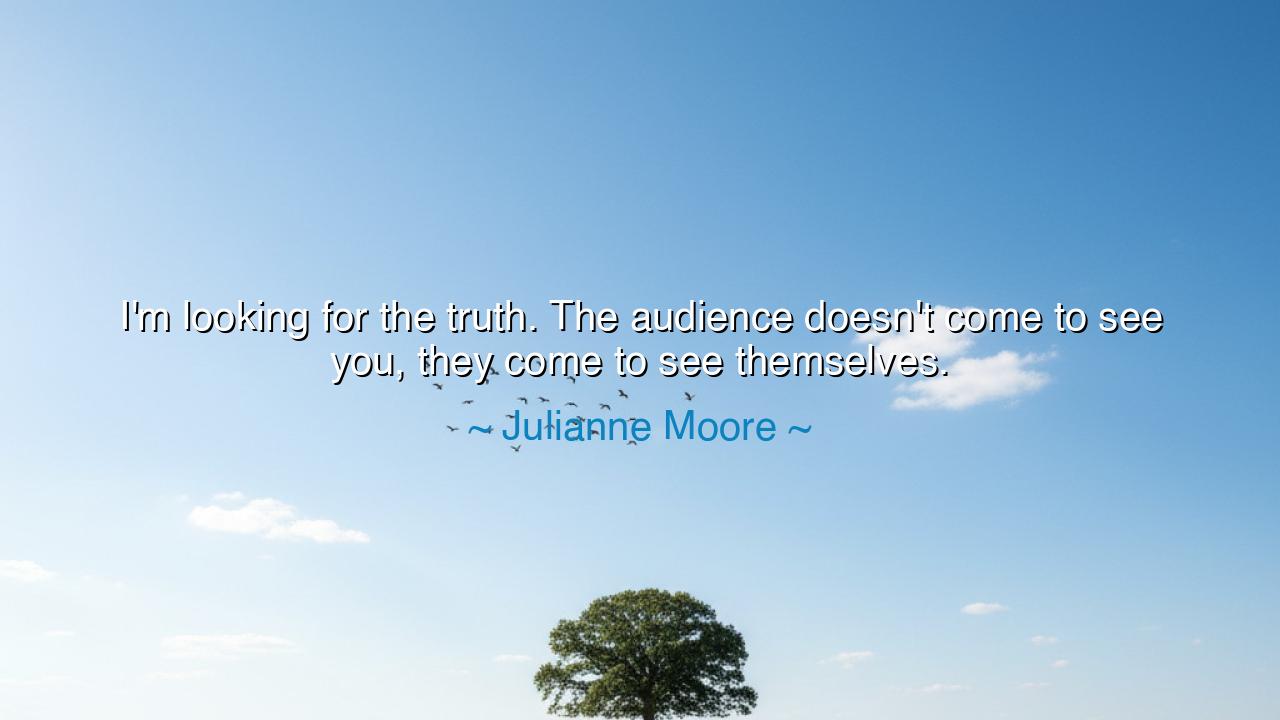
I'm looking for the truth. The audience doesn't come to see you
I'm looking for the truth. The audience doesn't come to see you, they come to see themselves.






The words of Julianne Moore—“I’m looking for the truth. The audience doesn’t come to see you, they come to see themselves.”—resound like an oracle’s voice echoing through the ages. She speaks not merely of the stage or the screen, but of the eternal covenant between the storyteller and the seeker. For in all times, from the fireside chants of the ancients to the glowing theaters of our day, the purpose of art has been to hold a mirror to the soul. The actor does not ascend to the stage to display their own glory; they rise so that every watcher may glimpse their own hidden depths reflected back.
To seek the truth, as Moore declares, is to strip away the vanity of performance. The performer who chases applause alone is like a hollow reed, making noise without substance. But the one who searches for the eternal essence of a character, who breathes life into human weakness and human triumph, becomes a vessel through which others recognize themselves. In this way, the actor is both priest and prophet, unveiling mysteries that lie already within the hearts of the audience.
Consider the tale of Sophocles, whose tragedy Oedipus Rex was performed in the theater of Dionysus more than two thousand years ago. The Athenians did not come merely to watch a king suffer; they came to confront the darkness of fate and the frailty of knowledge. As the blind seer revealed truths too painful to bear, each person in the crowd trembled, for they saw their own fear of destiny mirrored in Oedipus’ downfall. Sophocles, like Moore centuries later, understood this eternal secret: the stage is a mirror, and in it, all humanity is revealed.
So too, in our own age, when Nelson Mandela emerged after 27 years in prison and spoke not of vengeance but of reconciliation, the world did not behold only the man. They beheld what they themselves might become if they chose forgiveness over hate. His truth became their truth. His words were the stage, his life the performance, and his audience—all humanity—recognized themselves in his act of grace.
The audience hungers not for the mask, but for the unveiling. They yearn for their fears, their hopes, their loves, and their regrets to be spoken aloud by another, so that they may know they are not alone in their pilgrimage through life. When Moore says they do not come to see you, she reminds us that the ego must bow before the collective spirit. The performer is a doorway, not the destination. To confuse the two is to betray the sacred duty of art.
Let this teaching fall upon your heart: when you speak, when you work, when you create—do not ask, “How shall I be admired?” but rather, “What truth can I reveal that others may see themselves more clearly?” For in every life, whether on the stage or in the marketplace, there is an audience watching. They will not remember your polish, your perfection, your pride. They will remember the moment when, through your honesty, they recognized a fragment of themselves.
Thus, the lesson is clear: seek truth, not vanity. To embody this in your own life, practice the art of listening deeply. Share your own stories not to impress, but to connect. In your daily labors, act with authenticity, so that others may find courage to do the same. When you tell your struggles, you grant others permission to embrace their own. When you confess your fears, you remind them of their shared humanity. And when you celebrate joy, they, too, are lifted.
So walk as both seeker and mirror. Live in such a way that those who encounter you may discover themselves within your words, your deeds, and your silences. For as Moore has revealed, the truth is the eternal flame, and when it is kindled within you, it lights not only your own path but the path of all who behold you.






HNHang Nguyen
Julianne Moore’s insight about the audience seeing themselves rather than the performer is profound. It suggests that art serves as a mirror to our own lives. How much of the truth in art is shaped by the audience’s interpretation? This makes me wonder if, as creators, we’re ever truly in control of how our work is received, or if the truth we’re trying to convey is shaped by what the audience wants to see.
QCHa Quynh Chi
This quote by Julianne Moore seems to highlight the importance of relatability in art. When we watch a performance or listen to a speech, are we really focused on the individual or on how the situation mirrors our own thoughts and emotions? It’s fascinating to think that what draws us to art may not just be the artist’s truth but how it triggers our own self-reflection. Does this mean all art is a mirror of the audience?
UHUn Ha
I really like the perspective Julianne Moore offers in this quote. It makes me think about how performances, books, and films often resonate with us because they reflect aspects of our own lives. It’s not just about the actor or the story, but about the emotions and experiences the audience connects with. Is this why certain performances feel so deeply personal or transformative? How do we ensure we’re presenting the truth in a way that resonates with others?
AMcan anh minh
Julianne Moore’s quote about truth and audience perception is so interesting. It suggests that people aren’t necessarily coming to a performance or event to see the actor, but to reflect on their own experiences. This makes me wonder how much of art is actually about self-discovery rather than the artist’s expression. Are we really connecting with the performer, or are we just seeing ourselves reflected through their work?